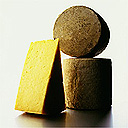
Regulations coming into force this month banning the advertising of cheese during television programmes aimed at children do give that impression. However, the Food Standards Agency, which devised the formula to identify evil foodstuffs - which include chocolate, several breakfast cereals and chicken nuggets - denies this.
"We're not saying cheese is a junk food," says Susanna Wahid, a spokesperson. "The model assesses which foods are high in fat, salt and sugar and is a tool for Ofcom [the broadcasting regulator] to assess which foods can or can't be advertised. Of the cheese products advertised between programmes aimed at children, 90% were of the highly processed variety." These include Cheestrings and Dairylea Dippers. Some cheese, such as cottage cheese, is low in fat and doesn't come under Ofcom's ban. Weirdly, camembert does, although I can't remember seeing that advertised to children.
The British Cheese Board, the self-styled "voice of British cheese", is understandably upset about the whole thing. "Cheese is a natural, safe, nutrient-dense product," says the board's secretary, Nigel White. "It's illogical to put cheese into the same category as nutrient-light, so-called junk foods."
But while a portion (30g) of cheddar contains a third of the recommended daily amount of calcium, it also has a third of the RDA of saturated fat. So is cheese bad? "It's a difficult one," says Bridget Aisbitt, a nutrition scientist at the British Nutrition Foundation. "If you eat too much, it can be bad for you, but as part of a healthy, balanced diet there is no problem." How much cheese can children eat? "It depends on the child," says Aisbitt. "If a child is healthy and does a lot of exercise, eating cheese every other day is fine. For a child who is overweight and not very active, I would say no more than once a week."

